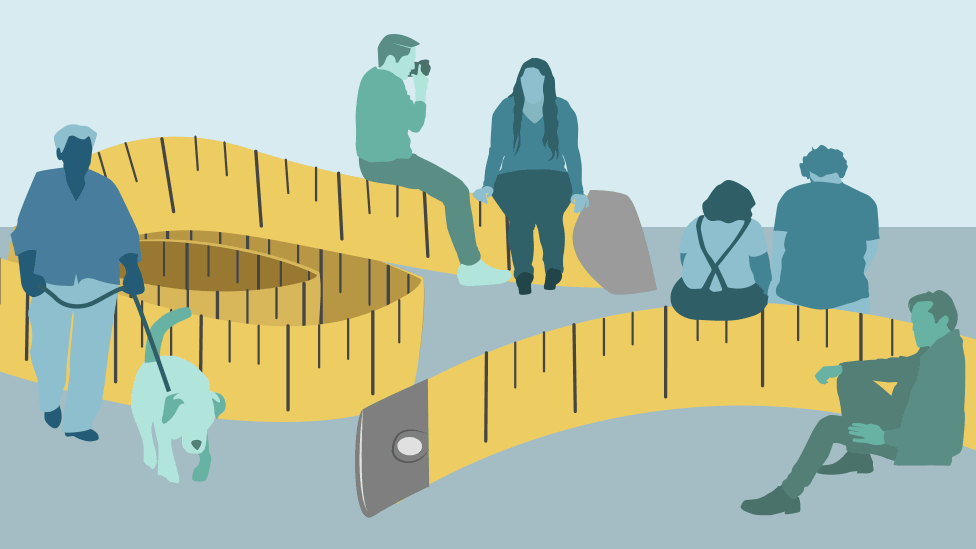Five things you might be surprised affect weight
- Published
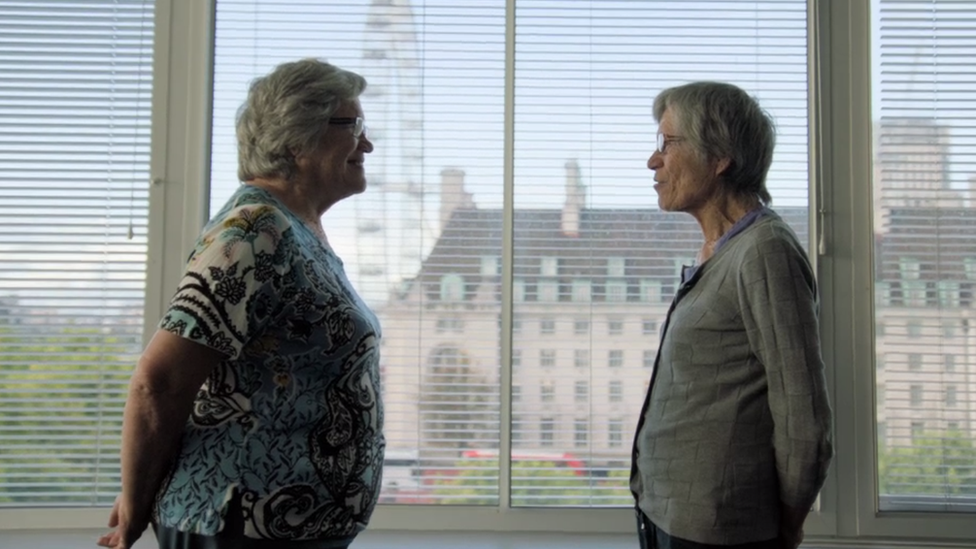
Jackie (left) and Gillian (right) are twins but have very different BMIs
People might think battling obesity is down to sheer willpower, but medical research says otherwise. Here are five potentially surprising factors that can affect your weight, as unearthed by The Truth About Obesity .
1. Gut microbes
Gillian and Jackie are twins - but one weighs over six stone (41kg) more than the other.
Prof Tim Spector has been tracking their progress over 25 years, as part of the Twins Research UK study.
He believes a lot of their weight differences are down to the tiny organisms - microbes - that live deep in the gut.
"Every time you eat anything, you're feeding a hundred trillion microbes. You're never dining alone," he says.
Can we trust BMI to measure obesity?
Is it wrong to be blunt about obesity?
A stool sample from each twin revealed Gillian, the thinner of the two, had a very diverse range of microbes, whereas Jackie had very few species living in her gut.
"The greater the diversity, the skinnier the person. If you're carrying too much weight, your microbes aren't as diverse as they should be," says Prof Spector, who found the same pattern in a study of 5,000 people.

Having a healthy and varied diet, rich in different sources of fibre, has been shown to create a more diverse range of gut microbes.
Prof Spector warns most Britons eat only half the fibre they should.
Good sources of dietary fibre include:
wholegrain breakfast cereals
fruits, including berries and pears
vegetables, such as broccoli and carrots
beans
pulses
nuts
2. The gene lottery
Why do some people diligently follow diets and exercise regularly but still struggle to see results, while others do very little and don't pile on the pounds?
Scientists at Cambridge University believe 40-70% of the effect on our weight is down to variation in the genes we inherit.
"It is a lottery," says Prof Sadaf Farooqi.
"It is now very clear that genes are involved in regulating our weight, and if you have a particular fault in some genes that can be enough to drive obesity."
Particular genes can affect a person's appetite, how much food they want to eat and what type of food they might prefer. Genes can also affect how we burn calories and whether our bodies can efficiently handle fat.
There are at least 100 that can affect weight, including one called MC4R.
It is thought about one in every 1,000 people carries a defective version of the MC4R gene, which works in the brain to control hunger and appetite. People with a fault in this gene tend to be more hungry and crave higher fat foods.
Prof Farooqi says: "There's not really anything you can do about your genes, but for some people, knowing that genes may increase their chances of gaining weight can help them to deal with changes in diet and exercise."
If you can't see the calculator tap or click here, external.
3. What time it is
There's some truth to the old saying: "Breakfast like a king, lunch like a lord and dinner like a pauper," but not for the reasons you might think.
Obesity expert Dr James Brown says the later we eat, the more likely we are to gain weight. Not because we're less active at night, as is commonly believed, but because of our internal body clocks.
"The body is set-up to handle calories much more efficiently during the daytime period when it's light than it is at night when it's dark" he says.
For that reason, people who do shift-work and erratic hours might face a particular battle to stave off weight gain.
During the night our bodies struggle to digest fats and sugars so eating the bulk of calories before about 19:00 can help you lose weight or prevent you from gaining it in the first place.
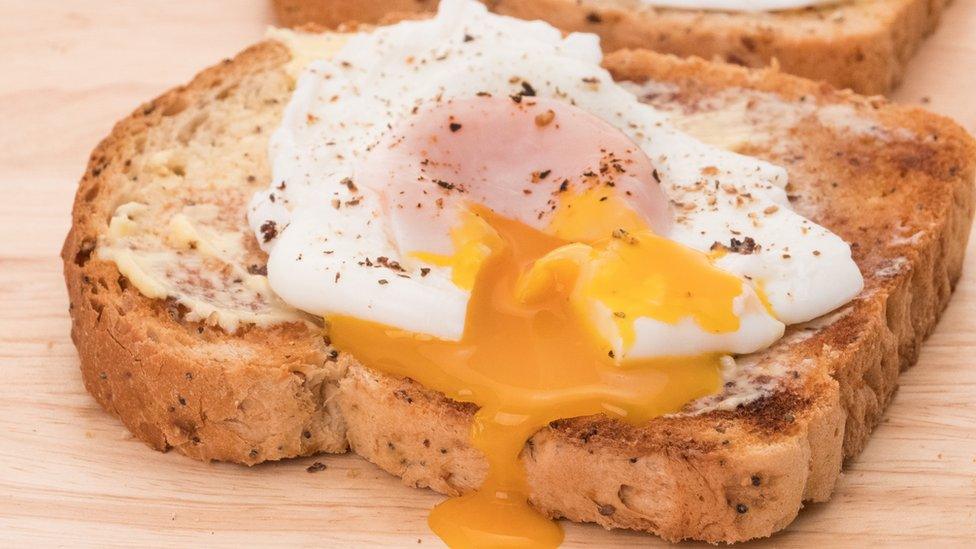
"Go to work on an egg" isn't a bad idea
Over the past decade, the average dinnertime in Britain has moved from 17:00 to around 20:00, and this has contributed to rising obesity levels, according to Dr Brown.
But today's working patterns and hectic lifestyles aside, there are things we can do that will make a difference to our waistlines.
Skipping breakfast or just having a piece of toast is a no-no in Dr Brown's book.
Instead, eating something with lots of protein and some fat, as well as carbohydrates - such as eggs on wholegrain toast - will make you feel fuller for longer.
Follow that up with a substantial nutritious lunch, and have something lighter at dinnertime.
4. Tricking your brain
The Behavioural Insights Team, external suggests Britons are bad at keeping track of how much they eat, and that calorie consumption is being underestimated by 30-50% as a result.
Behavioural scientist Hugo Harper suggests a number of ways to subconsciously change your eating behaviour, rather than rely on calorie counting.
For example, removing visual temptations might be more effective than relying on conscious willpower.
So don't have unhealthy snacks out on the kitchen counter - put a fruit bowl or healthy snacks in reach instead.
Don't sit down with a whole packet of biscuits in front of the television, put the number you plan to eat on a plate and take that through instead.
Dr Harper also encourages substitution behaviours - swapping to lower calorie alternatives of favourite foods rather than trying to banish them all together.
Opt for diet versions of soft drinks, for example. And reducing portion sizes can also be more effective than trying to cut out that ritual afternoon tea with a chocolate biscuit (or is that just us?).
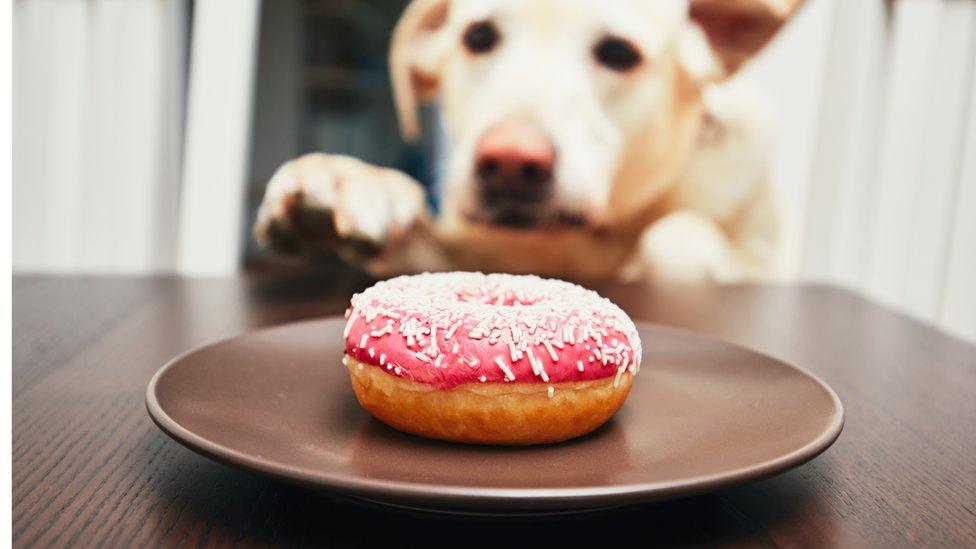
Not now Fido!
"People don't tend to notice a difference when their portion sizes are reduced by 5-10%," Dr Harper says.
There is a tendency to eat without thinking about it, so following the serving suggestions on food packets and using a smaller plate when dishing up dinner can prevent someone absent-mindedly chomping through excess calories.
5. Hormones
The success of bariatric surgery isn't just down to creating a smaller stomach, but the change in hormones it creates.
Our appetites are controlled by our hormones and it has been discovered that bariatric surgery - the most effective treatment of obesity - makes the hormones that make us feel full increase and the ones that make us feel hungry drop in number.
But its a major operation that involves reducing the size of the stomach by up to 90% and is only carried out on people with a BMI of at least 35.
Researchers at Imperial College London have recreated the gut hormones that cause appetite changes after bariatric surgery and are using this for a new clinical trial.
A mixture of three hormones are given to patients as an injection every day for four weeks.
"Patients are feeling less hungry, they're eating less and they're losing between 2-8kg (4-17lb) in just 28 days," says Dr Tricia Tan.
If the drug is proven safe, the plan is to use it until the patients reach a healthy weight.
The Truth About Obesity was on BBC One at 20:00 on Thursday 26 April, and is available on iPlayer
- Published4 April 2018
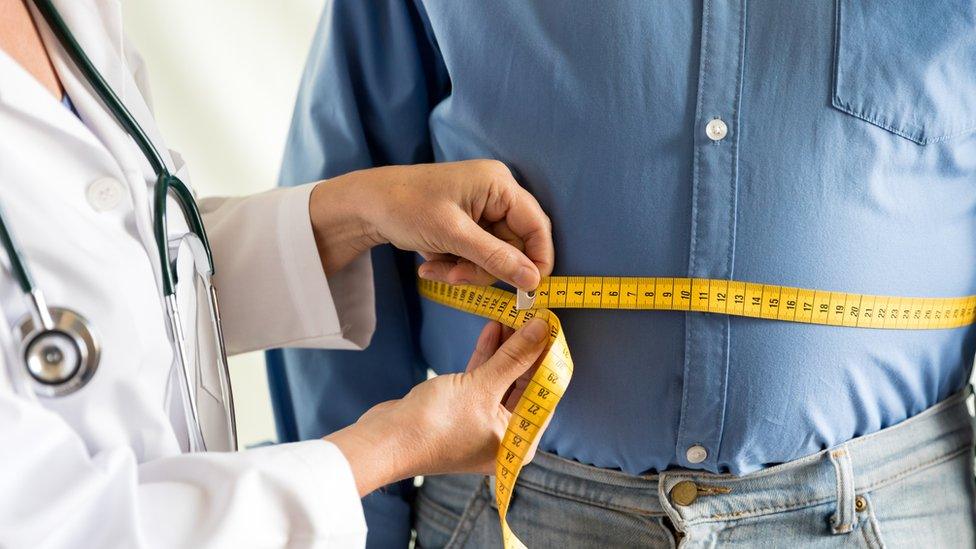
- Published23 March 2018
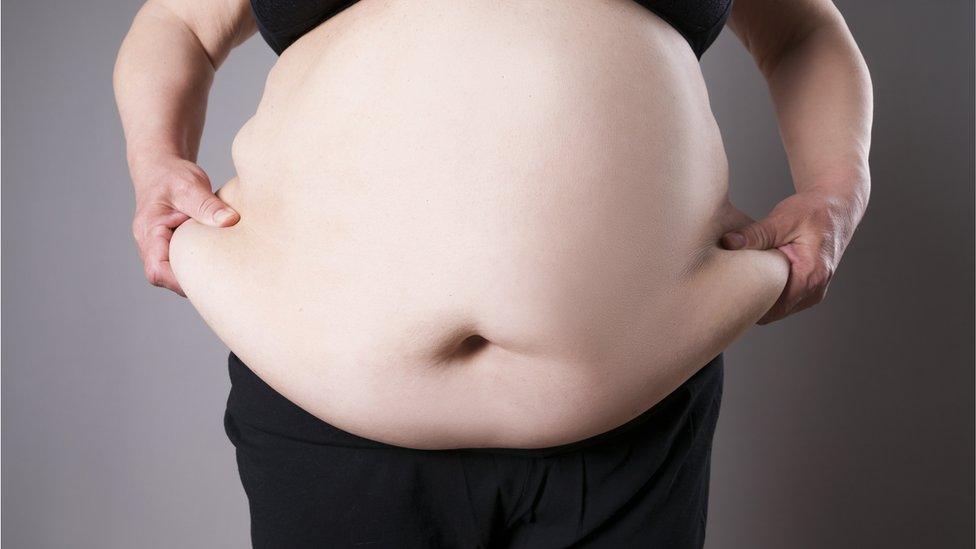
- Published24 April 2018
